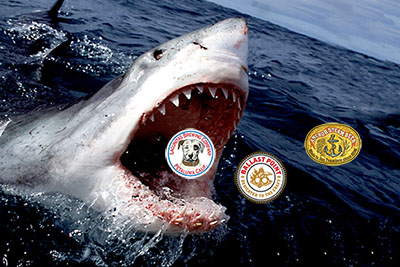Big Alcohol Buys Out Craft On Its Way to Monopoly
 In late July, international beer giant Sapporo announced it was acquiring Anchor Brewing, a large-but-limited, inconic San Francisco "craft" brewery. The news was met with dismay in craft brewing circles, but it falls well in line with a disturbing trend among megabrewers: buying out small brewers but continuing their labels, with an eye to flooding the shelves with faux-independent breweries. In the short run, this badgers smaller brewers off the shelves. In the long run, this is a recipe for monopoly.
In late July, international beer giant Sapporo announced it was acquiring Anchor Brewing, a large-but-limited, inconic San Francisco "craft" brewery. The news was met with dismay in craft brewing circles, but it falls well in line with a disturbing trend among megabrewers: buying out small brewers but continuing their labels, with an eye to flooding the shelves with faux-independent breweries. In the short run, this badgers smaller brewers off the shelves. In the long run, this is a recipe for monopoly.
Sapporo's acquisition was just the latest aggressive move by Big Alcohol. In May, Heineken ate Petaluma's Lagunitas. In 2015, Constellation (the parent company of Corona) bought San Diego's Ballast Point. The list goes on.
This is not merely a disappointing development for small brewers. These buyouts form the basis for Big Alcohol's current strategy to own the shelves. As NPR reports, megabrewers use these subsidiary brands in two ways: first, the multitude of captive brands allow them to flood distributors' shelves and local taps; and second, they create confusion among consumers who are trying to avoid these destructive and predatory global brands.
By grabbing for a greater market share, Big Alcohol threatens to further disintegrate an already-threatened "three tier" system. The system mandates that brewers not own distributors, but who cares about the integrity of that distinction if the distributors can't distribute anything but a megabrewer's many brands? In an era of more and more consolidation and its concomitantly growing lobbying power, the United States needs every systemic brake it can get.
Even if consumers wish to be part of that braking system, Big Alcohol has multiple tricks up its sleeve to fool the discerning eye. According to NPR, the "shelf-crowding" has the additional effect of making consumers think that certain beers--such as Goose Island, Sculpin, or Lagunitas--are more "authentic" or "ethical" than mass-market labels, even though the profits land in the coffers or Bud, Corona, or Heineken. Efforts to bend the market and manipulate this perception of "authenticity" do not stop at the tap; AB InBev bought into beer reviewing site RateBeer.com. RateBeer describes itself as "an active forum for beer lovers to come together and share opinions of beers, and beer retailers in a free environment. ... [T]he premier resource for consumer-driven beer ratings, features on beer culture and industry events, weekly beer-related editorials, and an internationally recognized, annual RateBeer Best competition." The potential to manipulate the market is evident. Imagine if Applebee's bought Yelp.
And while the industry pulls the wool over consumers' and regulators' eyes, Washington D.C. prepares to cut them an enormous check. The Craft Beer Modernization Act (S. 236/H.R. 747) offers billions of dollars of tax breaks over the coming decade to "craft" brewers, wineries, and distillers making up to 6 million barrels per year. For context, the entire craft brew industry grew by 1.4 million barrels last year; 6-million-barrel breweries are themselves Big Alcohol companies. With international monster brands waiting to gobble up these fake-craft labels, then gobble up each other, the only logical endpoint is a single company with a stranglehold on a lucrative, addictive, and dangerous product. If they are allowed to, big fish always eat smaller fish. Whatever friendly, rustic authenticity sub-brands like Lagunitas, Anchor, Sculpin, etc. project, they are not your buddies--they're just chum.
READ MORE on the giveaways written into S. 236/H.R. 747.
READ MORE about Big Alcohol's pulling of government strings.